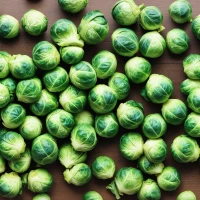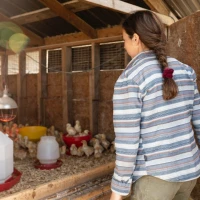When it comes to feeding chickens, backyard farmers and poultry enthusiasts alike are always seeking nutritious options that could add variety to their flock’s diet. One such food that often raises curiosity is Brussels sprouts. Rich in nutrients and resembling mini cabbages, Brussels sprouts have become a popular dietary choice for health-conscious humans, but the question arises: can chickens safely indulge in these leafy greens too? In this extensive guide, we’ll delve into the compatibility of Brussels sprouts with a chicken’s diet, outlining the benefits, potential risks, and best practices for serving them to our feathered friends.
Chickens are known for their voracious appetites and their ability to eat a wide range of foods, but not every human food is appropriate for them. Therefore, it’s crucial for chicken owners to determine what is safe and beneficial for their flock. As we uncover the secrets of feeding chickens Brussels sprouts, we’ll not only affirm if they’re a healthy choice but also how they can contribute to the wellbeing of your poultry.
Health Benefits of Brussels Sprouts for Chickens
Brussels sprouts are a powerhouse of vitamins and minerals, making them an excellent addition to your chickens’ diet. Before incorporating this vegetable into their feeding routine, it is essential to understand its nutritional value and how it can chickens have broccoli contribute to your chickens’ health.
Nutritional Components of Brussels Sprouts
- Vitamins: Brussels sprouts are rich in Vitamin C, Vitamin K, and various B vitamins.
- Minerals: They contain essential minerals like manganese, potassium, and iron.
- Fiber: High in dietary fiber, they can improve digestive health.
- Antioxidants: With antioxidants present, these sprouts can help in preventing cell damage in chickens.
Advantages of Feeding Brussels Sprouts to Chickens
Chickens can chickens eat broccoli benefit from the following when they eat Brussels sprouts:
- Improved immunity: The vitamin C in Brussels sprouts boosts the immune system.
- Bone health: Vitamin K plays a critical role in bone metabolism and overall skeletal health.
- Digestive regularity: Dietary fiber helps maintain a healthy digestive tract.
- Enhanced feather health: Vitamins and minerals promote vibrant and strong feathers.
Potential Risks and Considerations
While Brussels sprouts are generally safe for can chickens eat mango, there are potential risks that should be considered to ensure the safety and health of your flock.
Goitrogens and Thyroid Function
Brussels sprouts contain goitrogens, which can interfere with thyroid function if consumed in excessive quantities. This is particularly important for chicken feed for mango treess, as goitrogens can lead to reduced egg production and impact overall health. Therefore, Brussels sprouts should be fed in moderation.
Pesticide Exposure
Commercially grown Brussels sprouts may be treated with pesticides, which can be harmful to chickens. To minimize the risks, it is advisable to provide organic Brussels sprouts or wash them thoroughly before feeding.
Preparation and Feeding
Raw Brussels sprouts can chickens eat cabbage be tough and difficult for chickens to digest. Proper preparation is necessary to ensure that they are palatable and easy for chickens to consume.
Preparing Brussels Sprouts for Your Flock
Before you serve Brussels sprouts to your chickens, proper preparation is a must. Here’s a simple guide to making these sprouts a chicken-friendly treat czech streets beautiful 18 and uncle pervert.
Cleaning
- Wash Brussels sprouts thoroughly to remove dirt and pesticides.
- Trim off the stem and remove any damaged leaves.
Cooking
- Lightly steam the sprouts to soften them, making it easier for chickens to peck and digest.
- Avoid adding any seasonings, oils, or salt.
Serving Size and Frequency
- Cut steamed Brussels sprouts into small pieces or shred them to prevent choking.
- Offer them as a part of a balanced diet, not exceeding 10% of their total daily food intake.
Ensuring Variety
- Combine Brussels sprouts with other safe vegetables and grains to create a diverse diet.
Monitoring Your Chickens’ Response
When introducing Brussels sprouts or any new food to your chickens, it’s important to observe their reaction. Here’s what you should look for:
Acceptance and Preference
- Some chickens may be hesitant or show a strong preference for Brussels sprouts.
- Monitor which chickens are eating the sprouts and ensure that all have access to the treat.
Health and Behavior Changes
- Keep an eye out for any signs of digestive issues or changes in laying patterns.
- Watch for any allergic reactions or behavioral changes after eating Brussels sprouts.
By being observant, you can ensure that Brussels sprouts are a beneficial addition to your chickens’ diet and not causing any adverse effects.
Incorporating Brussels Sprouts into a Balanced Diet
A balanced diet is vital for the health and productivity of your chickens. Brussels sprouts can be a part of this diet if used wisely.
Combining with Other Foods
- Mix with other vegetables like carrots and leafy greens for variety.
- Add grains and proteins to create a complete and fortified meal.
Supplementing With Proper Nutrition
- Ensure that Brussels sprouts do not replace essential feeds that provide complete nutrition.
- Provide a consistent supply of fresh water, especially when feeding fibrous vegetables.
Adjusting Feeds Based on Egg Production
- Keep a close watch on egg production and quality, adjusting their diet as needed.
- Consult a vet or a poultry nutritionist if there are concerns about your chickens’ diets affecting their egg-laying capabilities.
Safety Tips and Best Practices
To safely introduce Brussels sprouts into your chickens’ menu, follow these best practices:
- Introduce Brussels sprouts gradually to avoid digestive upset.
- Opt for organic or homegrown sprouts to reduce exposure to chemicals.
- Remove any uneaten sprouts timely to prevent spoilage and attract pests.
Conclusion: Are Brussels Sprouts a Go for Chickens?
In conclusion, Brussels sprouts can indeed be a healthy treat for chickens if served properly and in moderation. They are packed with vital nutrients that can enhance the overall health of your flock, but it’s essential to consider the potential risks and observe the chickens’ responses carefully. With all the insights and tips provided in this guide, you can confidently incorporate Brussels sprouts into your chickens’ diet and watch them peck happily at their new green treats!










